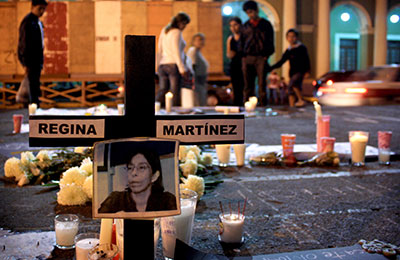Veracruz is a beautiful, long, thin state on the Gulf coast of Mexico where many journalists are terrified not only of the rampant organized crime groups that kill and control, but also of the state government. Fear that state officials will order them murdered for what they investigate or write has forced about a dozen journalists to flee the state, claiming that fear also puts a clamp on coverage for those who remain. Many journalists still working in the state tell CPJ they agree.
What federal officials told CPJ about the keystone evidence in the state’s most high-profile journalist murder–that of Regina Martínez Pérez, an esteemed correspondent for the highly respected national magazine Proceso–only adds to the fear. It makes it look as if the state is fabricating a murder case against the wrong people just to clear the books, while the guilty get away. And this is a case where journalists say high-ranking politicians have the most to gain by the reporter’s death.
According to the federal officials, the man who the state attorney general said had freely confessed to murdering Martínez claimed in his first appearance before a judge that he had been tortured and his mother threatened with death if he did not confess to the murder. The man, Jorge Hernández Silva, retracted his confession, according to the federal officials. Journalists in Veracruz confirmed the account. The court appearance was on Wednesday.
The state Attorney General’s office did not respond to CPJ’s requests for comment.
If the confession is gone, then there appears to be little left in a case in which the state has been bitterly and repeatedly accused by local journalists, Proceso magazine, and even federal officials of lying, covering up the truth, and hiding evidence.
When Hernandez’ arrest was announced on Tuesday–at a “press conference” where no questions were allowed—the state attorney general relied principally on the confession as the evidence against him. Theft was given as the motive. No mention was made of any match between Hernández, or an alleged accomplice not in custody, with fingerprint, blood, or DNA samples taken from the crime scene. Indeed, federal authorities close to the investigation told CPJ that none of those samples match anyone in the national criminal database. That is something that would seem to rule out both Hernández and his supposed accomplice as suspects, since the state says they have long criminal records.
Regina Martínez stood apart from other journalists in Veracruz. To begin with, unlike all the other eight journalists murdered in the state this year and last, Martínez did not cover the crime beat. She was the state correspondent for Proceso and she covered politics and high-level corruption. She was the queen of that realm, other reporters are eager to say. Veracruz is one of Mexico’s largest, most populated states, and by general consensus one of the most politically corrupt. That is a title hard to win. Martínez’s beat was a messy one in a dirty state. Just one illustration: the Milenio newspaper published a survey last week of the number of unidentified people buried in common graves by state authorities in the last six years. Veracruz came in first place for the country, with slightly over 5,000 bodies–bodies with no names and no one to claim them. That’s a picture of Veracruz. At first, the state refused to release the number of the dead on the grounds that it would violate the right to privacy of the unidentified bodies. That’s a picture of the government of Veracruz.
Martínez was killed last April 28, strangled in her bathroom, after investigators said she was surprised by her attacker or attackers. There were a few items stolen, including two cell phones and a flat screen TV. But other valuables were left, making theft a less-than-clear reason.
Immediately, her magazine, Proceso, said it did not trust any state official, including the governor, to run an honest investigation. Under Mexican legal rules, the magazine was allowed to participate fully in the investigation, and assigned a top reporter to join at every turn. Also joining as a full partner was the federal special prosecutor for crimes against journalists. Well, that’s what was supposed to happen. Proceso says both it and the special prosecutor were shut out completely of any important developments, were lied to repeatedly, and given false leads.
“What is clear though,” Jorge Carrasco, the Proceso reporter assigned to the task, told CPJ today, “is that at no point did the state ever consider Regina’s journalistic work as a possible motive for her murder.” In other words, if she was killed to stop an investigation of dirty politicians, that wasn’t going to be looked at.
The line of investigation that led to the arrest of Hernández, the man in custody, seems to have been done completely in secret by state authorities. Neither Proceso nor the federal government were informed, leading to questions about what the state had to hide.
In the first months after her murder, state officials began leaking to the local press that they had evidence she’d been killed by a lover. That’s what they whispered; they never showed any evidence.
Now, the state says the motive is theft.
Carrasco, speaking for the magazine, said, “We don’t believe them.”
